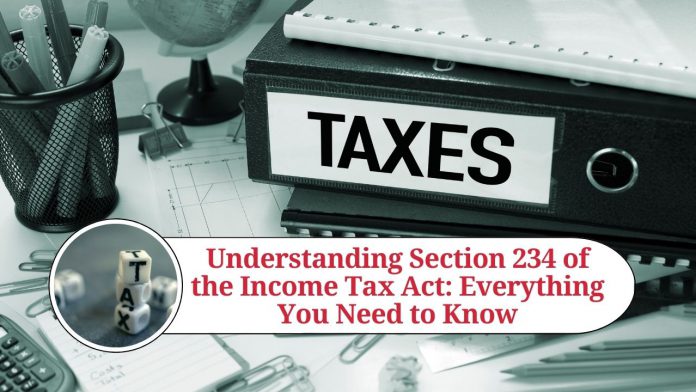Understanding Section 234 of Income Tax Act
The Income Tax Act of India is the legislation that governs the payment and collection of taxes in the country. One of the sections of this Act that taxpayers should be aware of is Section 234. This section deals with the interest charged on delayed payment of tax. Let’s dive deeper into the various aspects of this section.
Meaning of Section 234
Section 234 of the Income Tax Act, 1961, deals with the interest that is charged on taxpayers who fail to pay their taxes on time. It applies to taxpayers who have to pay advance tax or self-assessment tax. The section also applies to those who have to pay tax on regular assessment.
Interest Calculation under Section 234
The interest is calculated at the rate of 1% per month or part of the month. The interest is calculated from the due date of payment of tax until the actual date of payment. In case the taxpayer has paid tax in installments, the interest is calculated from the date of the installment to the actual date of payment of the tax.
Exceptions to Section 234
There are certain exceptions to the interest charged under Section 234. If the taxpayer has paid at least 90% of the total tax liability before the due date of payment, no interest will be charged. Also, if the taxpayer has paid any tax under Section 140A, no interest will be charged.
Penalty under Section 234
If the taxpayer fails to pay the tax within the specified time, a penalty will be levied. The penalty is calculated at 1% of the tax amount for every month of delay or part of the month. The maximum penalty charged is up to 50% of the tax amount.
Final Thoughts
In conclusion, Section 234 of the Income Tax Act is a crucial provision that taxpayers must understand. Failing to pay taxes on time can lead to interest and penalty charges, which can be significant. By staying informed about the due dates, interest calculation, and exceptions, taxpayers can avoid unnecessary charges and ensure compliance with the law. If you have any doubts or questions about Section 234 or any other tax-related matter, it is advisable to consult a qualified tax professional.
Read more useful content:
- section 145 of income tax act
- section 10e of income tax act
- section 9 of the income tax act
- section 94b of income tax act
- section 206aa of income tax act
Frequently Asked Questions (FAQs)
Here are some frequently asked questions related to Section 234 of the Income Tax Act:
What is Section 234 of the Income Tax Act?
Section 234 of the Income Tax Act deals with the interest charged on taxpayers who fail to pay their taxes on time.
What is the interest rate under Section 234?
The interest is calculated at the rate of 1% per month or part of the month.
When does Section 234 apply?
Section 234 applies to taxpayers who have to pay advance tax or self-assessment tax. It also applies to those who have to pay tax on regular assessment.
Are there any exceptions to Section 234?
Yes, if the taxpayer has paid at least 90% of the total tax liability before the due date of payment, no interest will be charged. Also, if the taxpayer has paid any tax under Section 140A, no interest will be charged.
What is the penalty under Section 234?
If the taxpayer fails to pay the tax within the specified time, a penalty will be levied. The penalty is calculated at 1% of the tax amount for every month of delay or part of the month. The maximum penalty charged is up to 50% of the tax amount.
What is the due date for payment of advance tax?
The due dates for payment of advance tax are 15th June, 15th September, 15th December, and 15th March.
What is the due date for payment of self-assessment tax?
The due date for payment of self-assessment tax is the date of filing the income tax return.
What are the consequences of non-payment of tax?
If you fail to pay the tax within the due date, you may be subject to penalty and interest charges under Section 234. In addition, if the tax authorities determine that you have deliberately avoided paying taxes or understated your income, you may also face prosecution under the Income Tax Act. This can result in imprisonment and/or a fine.
What should I do if I have doubts about Section 234 or any other tax-related matter?
It is advisable to consult a qualified tax professional if you have any doubts or questions about Section 234 or any other tax-related matter. They can provide you with guidance and help ensure that you comply with the law.




















